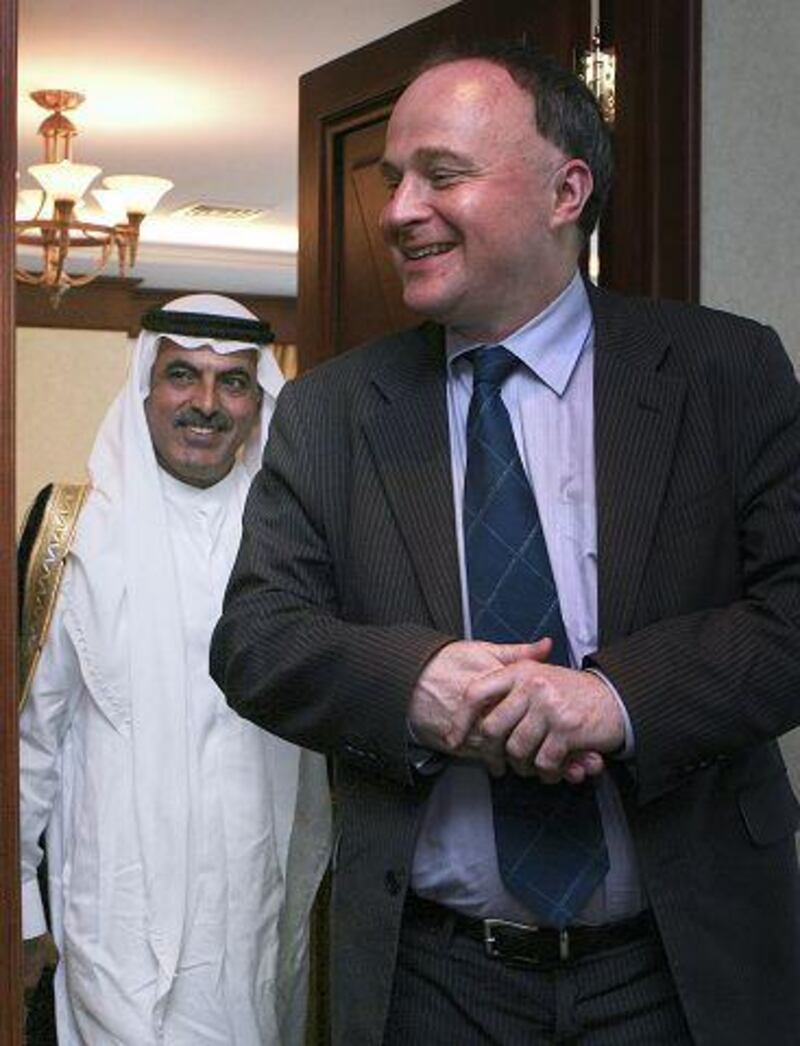DUBAI // A member of Britain's parliament plans to present a motion in the House of Commons that will push the issue of Iran's occupation of three disputed Gulf islands on to the British political agenda. John Grogan, an MP in the governing Labour party, yesterday met Abdul Aziz al Ghurair, Speaker of the Federal National Council.
He said he would present the motion in the autumn, after parliament's summer break. "I think that would be a way of keeping the issue on the political agenda," Mr Grogan told reporters at a press conference in Dubai. "If there is a motion on the question of the islands that means it's a live issue in the Foreign Office." On the eve of the UAE's independence in 1971, Iranian troops forcibly seized the three islands of Abu Musa and Greater and Lesser Tunbs. Iran has repeatedly shrugged off calls to settle the dispute diplomatically.
Mr Grogan met the FNC Speaker in London in January, when they discussed the need to raise the question in parliament. Last week Mr Grogan arranged a debate in Westminster Hall at which he presented to Ivan Lewis, a Foreign Office minister, the basis of the UAE's claim to the three islands, located in the Strait of Hormuz. It was the first time the issue had been raised in the Commons for nearly 40 years.
Mr Grogan, who represents the constituency of Selby in North Yorkshire, said he hoped the motion would be signed by members of the main British parties. Asked how many he thought would lend their names to it, he said: "I am a great cricket fan and in cricket the first target is 50 and the second target is 100 so I think those would be good targets. The first target would be 50 and you can go on from there."
He added: "The aim is to encourage members from different parties to sign the motion." Although the motion will be submitted to the Commons, it has very little chance of being debated. The idea, however, is to attract public attention through the media. Mr Grogan said he expected the motion to gain a significant number of signatories because of its issue-promoting nature. Mr al Ghurair said: "This is a mechanism that will make the subject automatically present on the agenda of the House of Commons.
"It's not for discussion, but rather putting the question of the islands on the agenda. "The idea is that the House of Commons will follow up on this issue with the British government and the Foreign Office," he said. Before the UAE's independence, the British government emphatically supported Sharjah's and Ras al Khaimah's claims over the islands. But since its withdrawal from the Gulf region, Britain has emphasised only the need to resolve the dispute peacefully.
In 1995 Douglas Hurd, the British foreign secretary, said during a visit to Abu Dhabi that the UAE's approach in handling the matter had been "resolute and cautious", adding that "we strongly support their move to resolve it at the International Court of Justice". Mr Grogan said it was "ridiculous" that the question of the islands' sovereignty had been neglected for several decades. "I am very hopeful," he said, "that the British government will recall its previous positions and will realise that it does have a historical responsibility to try to get this matter resolved.
"What we've succeeded in doing last week is getting it very much back on the political agenda in the United Kingdom. "Now we need to keep pressing and I will do that in the coming months." In the past two years, FNC delegations have secured support for the UAE's position from parliamentary and government leaders in Moscow, Rome, Warsaw and Ankara. "We are getting support from friendly countries. We are rallying worldwide," said Mr al Ghurair.
"At a certain time this issue will escalate and cause some debate between the two countries - be it bilateral, be it at the international court, be it at the UN. "At that time you need somebody who will give you the support and endorse your legitimate cause." mhabboush@thenational.ae






